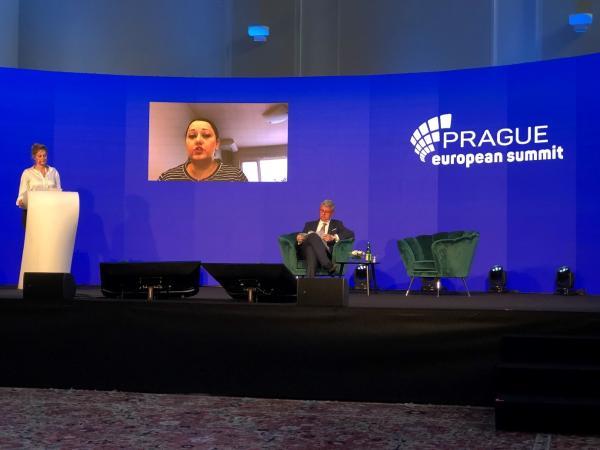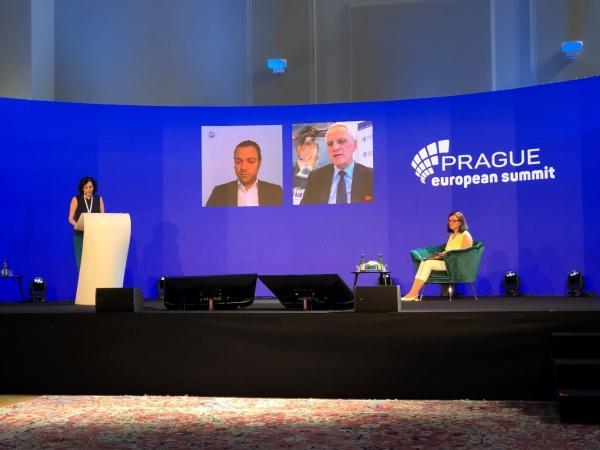Vice-Presidents of the European Investment Bank (EIB) Lilyana Pavlova and Kris Peeters spoke in separate panels at the Seventh Prague European Summit (PES) and shared the EIB’s views on COVID-19 recovery, the green transition and the future of sustainable mobility in the European Union.
Since its inception in 2015, the Prague European Summit advances strategic discussions about pan-European topics from a Central-Eastern European perspective. The EIB is working with the PES for the second year in a row to contribute towards high quality and inclusive public dialogue on key issues facing the European Union.
The summit is organised by the EUROPEUM Institute for European Policy and the Institute of International Relations Prague in cooperation with the Ministry of Foreign Affairs of the Czech Republic, the Office of the Government of the Czech Republic, and the Representation of the European Commission in the Czech Republic.
Vladimír Bartovic, director of the EUROPEUM Institute for European Policy said: “The Prague European Summit is immensely glad to continue our partnership with the European Investment Bank as this cooperation improves the quality and relevance of the public debate on the common challenges facing the European Union. Partners like the EIB are valuable in maintaining the position of the Prague European Summit as one of the key platforms for strategic dialogue in the European Union, and a major European forum for debates on EU global leadership, security, new technologies and the digital age, current economic and foreign policy challenges, and development trends in European society.”
Fair and sustainable recovery from the COVID-19 pandemic and the green transition

Vice-President Pavlova joined Karel Havlicek, Czech Deputy Prime Minister, Minister of Transport and Minister of Industry and Trade in a discussion on green COVID-19 recovery and the European Union’s green transition towards a carbon-neutral economy.
“COVID-19 recovery and the transition towards a carbon-neutral economy are two complementary processes that can support and fuel each other. Working towards the EU goal of becoming a carbon-neutral economy by 2050 can help COVID recovery, create jobs, income and business opportunities and create a long-term sustainable economic model for Europe and the world,” said Vice-President Pavlova, summarising her participation at the PES. “I was very happy to be able to take part in the PES and share what the EU bank can do for EU Member States to accelerate their recovery from COVID-19.”
After the panel, Vice-President Pavlova met representatives of the Czech-Moravian Guarantee and Development Bank (ČCMZRB) and signed a €191 million loan to unlock new sources of financing for municipal and regional-level infrastructure projects in the Czech Republic, key to Czech government plans to fuel faster COVID-19 recovery of the national economy.
Coronavirus outbreak: EIB Group’s response
Since the start of the COVID-19 pandemic, the EIB and the European Investment Fund (EIF) have approved more than €56 billion of targeted support for businesses most impacted by the crisis, public health and delivery of vaccines. Team Europe is contributing €500 million to the COVAX initiative to provide 1 billion COVID-19 vaccine doses for 92 low and middle-income countries across Africa, Asia, the Caribbean and Pacific.
The EIB Group created EGF, a €25 billion fund, in response to COVID-19. This guarantee fund enables the EIB Group — in partnership with local lenders and national promotional institutions — to scale up its support for small and medium-sized companies (SMEs) and others in the real economy by mobilising up to €200 billion, in addition to the support package already announced.
The Fund was endorsed by the European Council as part of the overall EU COVID-19 response package.
The EIB Group has also announced details of a comprehensive response to the coronavirus pandemic outside the European Union that will provide up to €6.54 billion in the coming months. This financing is part of the Team Europe response and is supported by guarantees from the EU budget. It will both strengthen urgent health investment and accelerate long-standing support for private sector investment that reflects financing needs in more than 100 countries around the world.
The EIB Group will also provide €1.7 billion to support the social and economic recovery of the Western Balkans from the COVID-19 pandemic, as part of a €3.3 billion financial support package for the region announced on 29 April by the European Commission.
Sustainable and green future for Europe
Vice-President Peeters took part in one of the plenary panels at the PES dedicated to the future of mobility and its role in post-pandemic recovery, and spoke on the necessity to create new, resilient and sustainable communities as we recover form COVID-19.
The panel focused on the unprecedented change in the transport sector and political, economic, social and technological trends influencing the sector, focusing on the future of mobility and the new mobility ecosystems offering accessible, efficient, clean and safe transport solutions.
“We need to enable more than one technological pathway to create real, green options for the whole transport sector, as the investment decisions we make today will determine success or failure in the decades ahead,” said Vice-President Peeters at the panel.
Vast amounts of carbon dioxide (CO2) and exhaust gases created by the transport sector make it a major contributor to climate change and air pollution. Transport is the second-largest source of global greenhouse gas emissions and accounted for 24% of CO2 emissions from fuel combustion in 2018.

Role of the EIB in the transformation of the transport sector
Addressing the role of transport sector transformation in the context of wider climate action activities, Vice-President Peeters wrote for the Brussels-based “New Europe” ahead of the meeting and noted: “Instead of fossil fuels, more money needs to go into green industries, such as wind and solar energy, and energy efficient upgrades of buildings and sustainable transport. The financial sector plays a key role in the transition to a greener economy. With the implementation of the new EU taxonomy for green investments, which the EIB helped to develop, investors now have a tool to measure the contribution of their money toward climate action. The combination of cost efficiency and transparency can help to attract more investment in climate action making it easier to reach our goals.”
Vice-President Peeters took part in the panel together with Maros Sefcovic, Vice-President of the European Commission, Zdenek Hryb, Mayor of Prague, Nika Kotovica, Urban planning expert for the City of Riga, and Marian Bocek, CEO of InoBat Auto.
A look into the future of transport lending in the European Union
Since the beginning of its operations in 1958, the EIB has provided long-term finance to support the development of many of the transport networks that have helped the European economy and our societies to thrive and grow closer together.
Today, the EIB Group is playing a significant role in the transformation of mobility and transport for a low-carbon future in Europe and beyond. To support a green and competitive economy, the Bank aims to accelerate the take-up of sustainable transport solutions by scaling up and attracting private investment and ensuring balanced regional development. In addition to our financing, the EIB also provides technical assistance and advisory support.
New mobility business models and technologies play a crucial role in enabling the transformation of transport towards zero-emission standards. That is why the Bank’s focus has broadened in recent years beyond larger infrastructure projects to support for smaller innovative ones. The EIB Group promotes research and development in the area of cutting-edge technologies such as alternative fuels, e-mobility including batteries, fuel cells and charging stations, autonomous driving and artificial intelligence. At the same time, we help Europe’s entrepreneurs bring their ideas to market and compete on the global stage.
The EIB is currently reviewing its transport lending policy and will launch a public consultation in the second half of 2021 to align its transport investment with its Climate Bank Roadmap and the Paris Agreement.